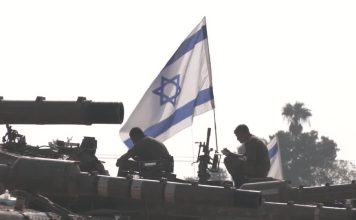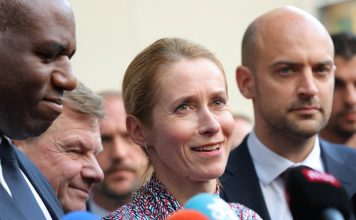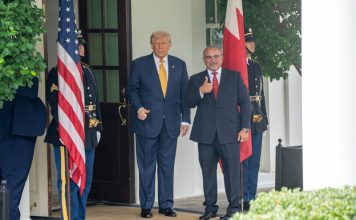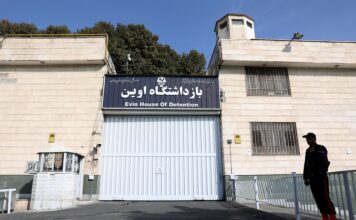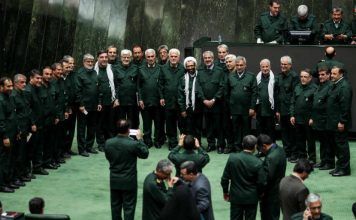By Kayhan Life Staff
Iran has rejected a recent joint statement by the Gulf States and Russia, proposing that the dispute over ownership of the three Persian Gulf Islands of the Greater and Lesser Tunbs and Abu Musa be resolved either through direct negotiations between Iran and the United Arab Emirates (UAE), or by the International Court of Justice (ICJ).
Following the sixth round of talks in Moscow, Russia and the Gulf Cooperation Council — a regional union of Bahrain, Kuwait, Oman, Qatar, Saudi Arabia, and the United Arab Emirates — recommended that Iran and the UAE resolve “their dispute over the three islands through direct negotiations.” Otherwise, the “matter must be referred to the International Court of Justice (ICJ), where it could be resolved in line with international laws.”
[aesop_image img=”https://kayhanlife.com/wp-content/uploads/2023/07/2023-07-10T115743Z_1161735872_RC2B02ACY04Q_RTRMADP_3_UKRAINE-CRISIS-RUSSIA-GULF.jpg” panorama=”off” credit=”Russian Foreign Minister Sergei Lavrov leaves with his counterparts of the Gulf Cooperation Council (GCC) member states and the GCC secretary general after posing for a family photo prior to their meeting in Moscow on July 10, 2023. NATALIA KOLESNIKOVA/Pool via REUTERS” align=”center” lightbox=”on” captionsrc=”custom” captionposition=”left” revealfx=”off” overlay_revealfx=”off”]
Iran quickly dismissed the joint statement by Russia and the Gulf Cooperation Council.
“These islands belong to Iran forever, and the recent statement contradicts the friendly ties between Iran and its neighbors,” Iranian Foreign Ministry Spokesperson Nasser Kanaani said on July 11.
The Iranian Foreign Ministry also summoned the Russian ambassador to Tehran, Alexey Dedov.
“Following the release of a statement at the end of the sixth round of strategic talks between the Russian Foreign Ministry and the Gulf Cooperation Council regarding the Iranian Islands of the Greater and Lesser Tunbs and Abu Musa, Assistant Foreign Minister for Persian Gulf Affairs Alireza Enayati summoned the Russian ambassador today, July 12, and lodged a formal complaint with the ambassador regarding the statement,” the Islamic Republic News Agency (IRNA) reported.
The recent statement by Russia and the Gulf Cooperation Council is an embarrassment for Iran’s Supreme Leader Ayatollah Ali Khamenei, who has described Russia as Iran’s “strategic partner” and continues to promote a foreign policy that revolves around “looking to the East” for support.
This is not the first time that one of Iran’s “strategic partners” has refused to side with Iran over the disputed islands.
China and the Gulf Cooperation Council issued a similar statement following a meeting in December 2022 attended by Chinese President Xi Jinping.
The statement said: “The leaders support the UAE’s peaceful and innovative efforts to resolve the dispute over the three islands of Greater and Lesser Tunbs and Abu Musa. They support bilateral talks in line with international laws.”
“The Islamic Republic has become so weak on the global stage that, at the end of their meeting, the Chinese leadership and the Gulf Cooperation Council called for a peaceful solution to the dispute over the three islands of Greater and Lesser Tunbs and Abu Musa,” a tweet on Dec. 10, 2022, by Kayhan London, said.
The tweet included a picture of President Xi at the meeting with the leaders of the Gulf Cooperation Council.
The caption to the photograph read: “China ignored Iran’s rightful claim to the three islands. Does the Islamic Republic have the courage to protest?”
Some political observers in Iran argue that the government’s objections to the Chinese and Russian stance against the interests of the Islamic Republic will be ineffective.
In an interview with the Tehran-based Entekhab news website on July 11, Mohammad Ghasem Mohebali, former head of the Middle East section of the Iranian Foreign Ministry, said: “Iran’s friends care more about the interests of Iran’s rivals than those of Iran’s.”
Mr. Mohebali attributed China and Russia aligning themselves with the Gulf States to “the capabilities” of those countries and their “successful transactional relationships.”
“They can see that Iranian policies are weak and useless,” Mohebali argued. “They are certain that Iran would not object to any decision they make, and also know that Iran will not change its stance on Tibet and Taiwan, but is worried about the Arabs.”
“China and Russia have a much larger trade volume with Arab countries than Iran, which stems from our imbalanced foreign policy towards the West,” Mohebali noted. “China takes full advantage of the situation, naturally.”
In an interview with Independent Persian TV, Mehrdad Khonsari, a political activist and former diplomat, said Russia’s refusal to give its unequivocal support to Iran in its dispute with the UAE over the three islands was not a reversal of its position.
“I do not think this was a U-turn. It was more of a public relations move,” Mr. Khonsari argued. “The statement said that members of the Gulf Cooperation Council and Russia would like to see the dispute over the islands between Iran and Arab countries, which dates to the 1970s, be resolved through direct negotiations between Iran and the UAE or be referred to the International Court of Justice in the Hague.”
“They did not say that the three islands did not belong to Iran,” he added.
In an interview with the London-based Manoto TV on July 11, Hojjat Kalashi, a political activist, said: “Iran has never accepted UAE’s claim and does not recognize it as a dispute between the two [countries.] It considers the claims as a misunderstanding or imaginary.”
Mr. Kalashi noted that besides Russia, Iran’s ally Oman has also supported the recent statement issued in Moscow. Kalashi added Russia did not regard the Islamic Republic as its strategic partner. It is taking advantage of the current situation to safeguard its interest.
Except for the Iranian Foreign Ministry spokesperson, no other government official has reacted to Russia’s apparent sympathetic stance to the UAE’s claims over the three islands.
Russian President Vladimir Putin’s unwillingness to recognize Iran’s claims over the three islands starkly contrasts the Islamic Republic’s unequivocal military support for Russia’s war in Ukraine, including supplying its forces with suicide drones.
The Greater and Lesser Tunbs islands and Abu Musa, in the Strait of Hormuz between the Persian Gulf and the Gulf of Oman, have been part of the Iranian territories since the 14th century.
The British Empire occupied the islands in 1921, placing them under the administration of the Emirate of Sharjah, which later became one of the UAE’s seven emirates.
Iran reasserted its sovereignty over the three islands after the withdrawal of the British Colonial Forces in 1971 and the formation of the UAE. Since then, Iran has controlled the three islands and their territorial waters, airspace, continental shelf, and economic zones.
Since coming to power in 1979, the Islamic Republic has failed to protect the country’s territorial integrity and mismanaged its economy.
Shortly after the victory of the Islamic Revolution, the political mayhem in Iran emboldened Iraqi dictator Saddam Hussain to invade the country, waging a war that lasted eight years, causing death and destruction.
In November 2021, Iran and Russia signed a 20-year contract that included developing and mining the Chalous Gas Field in the Caspian Sea and water reservoirs in Iran’s north.
“A deal signed last week to develop Iran’s multi-trillion-dollar new gas discovery, the Chalous field, will see Russian companies hold the major share in it, followed by Chinese companies,” the OilPrice news website reported on Nov. 15, 2021.
“According to one of the senior Russian officials involved in negotiating the deal, ‘this is the final act of securing control over the European energy market,’” the article added.
Senior Islamic Revolutionary Guards Corps (IRGC) commanders argued that giving Russia and China a significant share of these lucrative projects was vital in developing Iran’s ballistic missile program.
Chalous’s gas reserves are as large as the South Pars Phase 11 conventional gas development, producing 1,000 million Cubic Feet per Day (MMCFD) of natural gas.
Iran and China signed a 25-year accord in March 2021 in Tehran. Less than 48 hours after the agreement was formalized, some 120,000 people signed a petition on social media, protesting “selling” Iran to China.
It still needs to be determined if the agreement is a contract, a memorandum of understanding, or just a roadmap.
A day after the document was signed, people in many Iranian cities, including Tehran, Isfahan, and Karaj, poured into the streets, protesting what they said amounted to “selling Iran.”



